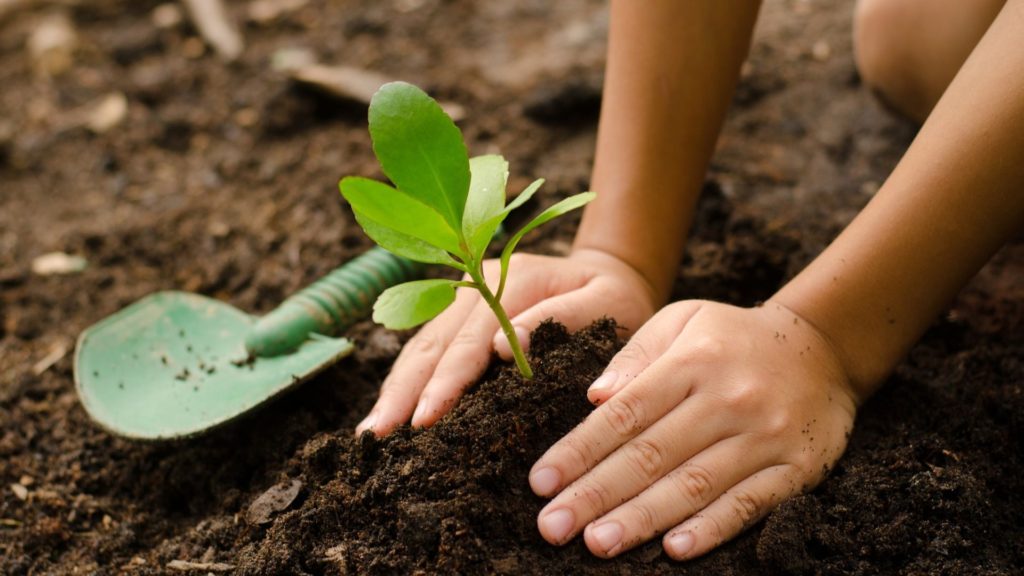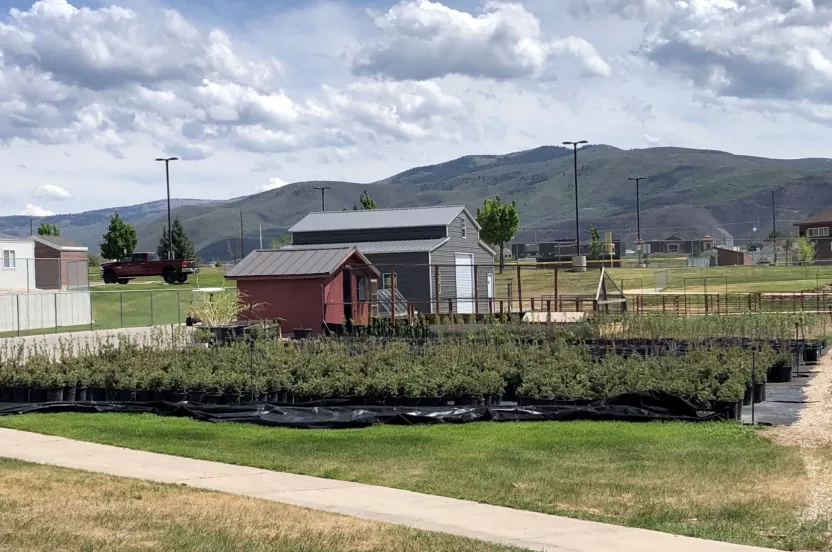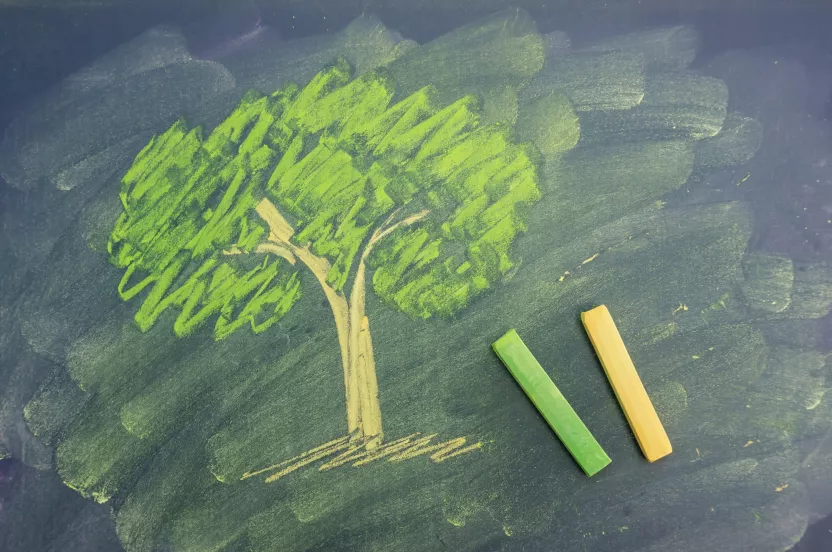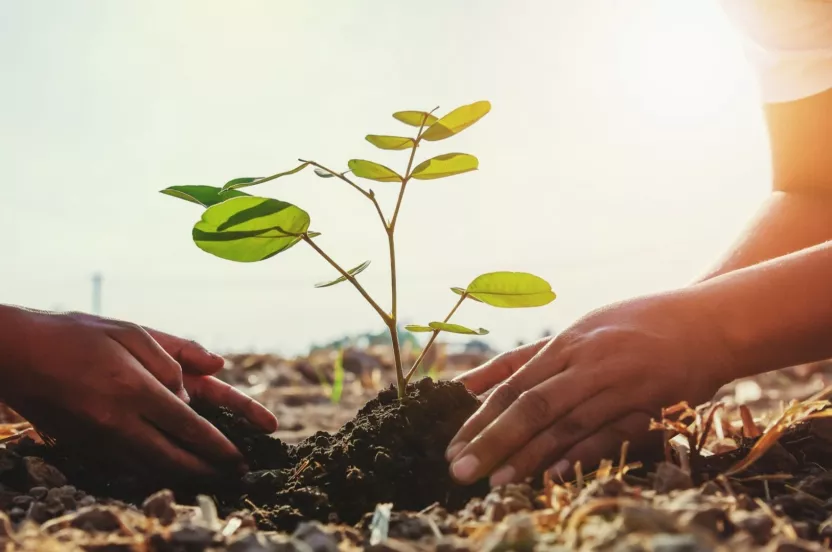Now live: The 2025 Canopy Report. Learn how Americans see trees. GET THE REPORT
This story is from the November/December Arbor Day Foundation Newsletter. Sign up for the Arbor Day e-news to get updates right to your inbox.
THERE IS NO QUESTION THAT CHILDREN have a connection to nature. You can see it as they explore a forest trail, climb a tree, or collect more pine cones than they can carry.
It is at this point, when they are young, that we have an extraordinary opportunity to instill in them a lifelong love of trees and a commitment to conservation. With the success of the Tree Campus USA® program, the Arbor Day Foundation saw an opportunity to inspire and celebrate tree planters at this younger age. And so the Tree Campus K–12 program was born.
This program is designed to inspire the next generation of tree stewards through experiences that bring the benefits of trees to life both inside and outside the classroom. This new program fosters positive connections between students and the trees in their community, cultivating within its participants a lifelong respect for trees.
Read: Tree Campus K-12: Inspiring Young Stewards of the Earth
As the name suggests, this recognition program is geared toward schools providing elementary through secondary education.
It was developed through careful collaboration with educators, and several
schools were included in a pilot year to help define goals and paint the picture of how this program could be integrated in a variety of school settings across the country.
Following are examples of how some of the pilot schools met each of the goals for Tree Campus K–12 recognition.
Goal: Tree Campus Team
At Edmond North High School in Edmond, Oklahoma, an existing club — Students United for Nature — stepped up to form the Tree Campus Team. Also included in this team were two teachers, the school principal, and Edmond’s city forester. The group met multiple times throughout the year to plan and organize tree-related events. The Tree Campus Team for
Borton Magnet Elementary in Tucson, Arizona, consisted of students and parents who met regularly with local nonprofit (and Alliance for Community Trees network member) Trees for Tucson. This organization provided guidance on nurturing the school’s campus trees.
Goal: Education Plan
The city foresters of Highland Park, Illinois, visited environmental science classes at Highland Park High School to educate students about urban forestry, its history, and the current urban forestry efforts happening in their own community. And the students were inspired in two ways. First, they learned about what it means to have a career in trees. And second,
many decided to take advantage of volunteer opportunities to support
city tree efforts.
Abington Friends School of Jenkintown, Pennsylvania, took a tailored approach to tree education at multiple elementary grade levels. Kindergarteners were inspired by the Dr. Seuss book The Lorax to come up with ideas about how they could plant and nurture trees. First graders wrote poetry about trees on campus that inspired them, beginning with lines like, “Rustling leaves sound like squirrel footsteps,” and “A multi-colored rainbow from red to orange to yellow to green.” Relying on cardboard tubes and recycled materials, fourth graders were challenged to create freestanding trees to be used on the set of their Winter Program. And a tree conservation project was at the center of the annual Martin Luther
King Day of Service, which brought together students, families, and community members.
Goal: Hands-On Experience
After learning the value of campus trees through an inventory and i-Tree
exercise and receiving education on proper care techniques, the Tree Campus Team at Tucson, Arizona’s Palo Verde Magnet High School (who have enthusiastically named themselves Arbor Force) met with the campus and district authorities responsible for the care and maintenance of campus
trees to present a plan of informed recommendations regarding campus trees. And despite previous challenges in gaining support for new trees on campus, the students gained permission to plant a new tree — an excellent example of students leading the way to create a greener campus and earning consideration through thoughtful learning and preparation.
Goal: Arbor Day Observation
The students of South Grand Prairie High School in Grand Prairie, Texas,
focused their Arbor Day activities around younger children. They
participated in an event at a local nature center by preparing and
manning a group photo station filled with fun props and based on the Dr. Seuss classic The Lorax. This provided an opportunity to engage and educate children who visited the exhibit about the importance of planting trees.
A Successful Start. A Bright Future.
Several schools were included in a pilot year of the Tree Campus K–12 program, and the outcomes and feedback — from teachers, administrators, and students alike — were overwhelmingly positive. This program is a true testament of the power of connecting youth with nature in a meaningful way, and the Foundation is excited to have launched this program for all schools across the U.S. earlier this fall.
To learn more about program goals, eligibility, and more, visit arborday.org/k12.





